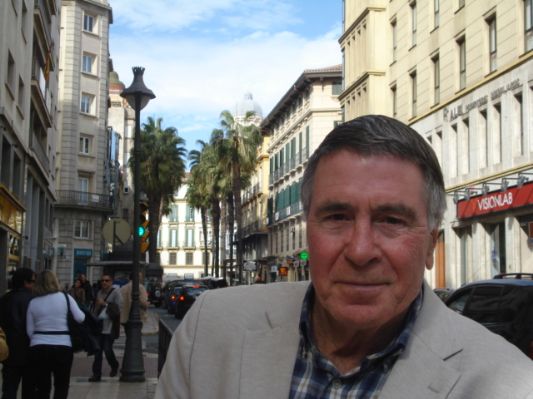Not Looking Forward to Christmas
Saturday, August 31, 2013

NOT LOOKING FORWARD TO CHRISTMAS
Michael Walsh
On the face of it, the idyllic Andalucía hills forming a backdrop to Estapona are an unlikely lair for a whistleblower whose revelations could threaten a country’s senate and expose the European Union to charges of cover-up and fraud.
When Latvian anti-corruption dissident John Christmas rumbled Latvian state deceitfulness, his primary need was to produce and film the evidence in a secluded and tranquil area. Magic Sound Recording Studios, a company that has world-class artistes on its client base, was happy to oblige. The dissident, dubbed the Julian Assange of suspect politicians and Russian oligarchs, used the hidden studio to provide the camera work and sound track for his explosive video.
Understandably, banks, Russian oligarchs and complicit politicians are not looking forward to Christmas. The dissenter was the whistleblower from Parex Bank of Latvia. The nationalisation of this bank brought about the Latvian financial crisis on November 8, 2008. Consequently, the European Union (EU) was obliged to bail out Latvia, a country as big as the Republic of Ireland.
The political exile slipped into the studios on July 22. His purpose was to produce a Youtube video, Latvia EBRD Fraud 2013. It was an instant hit it received thousands of hits within days of its release on August 23. The aim is to reach 100,000 viewers and generate enough people power to expose corruption in high circles.
The revelatory video is a public humiliation for moneychangers who thought they had stage-managed what is possibly the biggest heist of public money in the history of Baltic States. Magic Sound Recording Studios is visible at the beginning of the video.
http://www.youtube.com/watch?v=APZ-E-X0Cow
http://www.magicsound.com/services.htm
 0
Like
Published at 5:21 PM Comments (0)
0
Like
Published at 5:21 PM Comments (0)
HUNGARY SHOWS SPAIN THE WAY
Tuesday, August 27, 2013

SHOULD SPAIN FOLLOW HUNGARY’S EXAMPLE
The Hungarian government, now regarded by the unelected EU leaders as a rogue nation, has expelled the International Monetary Fund (IMF). This bankers’ cartel has been told to clear its Budapest desk and to not slam the door on the way out. The European Central Bank (ECB) has also been told, ‘thanks but no thanks’ by Hungary’s government.
Describing the radical move as an historical decision is overstepping it. Flinging the money-changers out of the temple has been done before, most notably by the German government in 1933. They paid a high price for their impertinence. So did other ‘rogue nations’ that decided to cut themselves lose from the banking cartels. The Libyan government and those of Iran, Saddam Hussein’s Iraq, President Assad’s Syria were or are being dealt with.
Other financially independent countries are too big for the bankers to consider sending in the heavies (NATO). Brazil, Russia, India, China and South Africa (BRICS). Where will Hungary fit in? I should imagine that the EU and its bankers have painted themselves into a corner on this one. They want Hungary reined into the European Union. However if the EU takes a confrontational stance then Hungary could easily be driven into the arms of Vladimir Putin’s Russia.
The global rebellion against the bankers’ cartels appears to be gathering momentum. Iceland not only threw out the bankers, it filed charges against them. The heads of Iceland’s banking system were declared fugitives and fled to Europe. Recently, Hungarian Prime Minister Viktor Orbán, promised to serve similar justice on his socialist predecessors.
The Hungarian leader charges that previous administrations sold the nation into unending debt slavery under the terms of the IMF. The governments of Spain, Greece, Italy, Portugal and Ireland, are just some of the other European states that imposed bankers debt slavery on their hard-earned citizens.
More savvy than their fellow Europeans, the Hungarians elected Victor Orbán’s Fidesz Party. Hungary’s popular prime minister told the IMF that Hungary neither wants nor needs further ‘assistance‘ from the Wall Street orchestrated banks.
No longer will Hungarians be forced to pay usurious interest to private, unaccountable central bankers. Instead, the Hungarian government has assumed sovereignty over its own currency. It now issues money debt free, as it is needed.
The results have been nothing short of remarkable. The Hungarian nation’s economy, formerly staggering under deep indebtedness, has recovered rapidly.
The Hungarian Economic Ministry recently announced that it has, thanks to a ‘disciplined budget policy,’ repaid on August 12, 2013, the remaining €2.2B owed to the IMF, well before the March 2014 due date. Victor Orbán declared: “Hungary enjoys the trust of investors. He was referring to investors who produce something in Hungary for Hungarians and fuelled genuine economic growth. It is estimated that if Spain followed Hungary’s example prosperity would be returned in months. Will the ‘get out of gaol’ option catch on?
 0
Like
Published at 10:58 AM Comments (16)
0
Like
Published at 10:58 AM Comments (16)
LAND OF MY FATHERS
Tuesday, August 20, 2013

I have nothing against the Welsh. After all, as man and boy, I was blissfully happy in the land of someone else’s father. However, not everyone agrees. Their most famous lyricist, Dylan Thomas once said, “Land of my Fathers? They are welcome to it.”
The Welsh comedian, Max Boyce, did not share his sentiments. Tongue in cheek he reminded the English that if an iron was run over Wales then his land would be bigger than England once the wrinkles (mountains) were ironed flat.
The Welsh sense of humour tends to be sardonic. What do you call an Englishman in the knockout stages of the world Cup? The referee.
There is delicious rivalry. What do you call a Welshman with several sheep? A pimp. Their brand of humour can be enlightening. I recall using a lane approaching a Welsh farm. The notice said, Slow! Free Range Children.
Noted for their sullen insularity the Welsh are notoriously anti-stranger. I thought it was because they thought me English. No, my son, who has a strong Welsh accent said “they show dislike for me too.”
Whoever penned the lines There‘ll be a Welcome in the Hillside / There‘ll be a Welcome in the Vale, should be dragged before the courts for misrepresentation. I have asked locals in real Welsh-speaking Wales, the Lleyn Peninsular, Anglesey and Snowdonia if it is true that they do not welcome visitors. Agreeably they agree.
Venting my frustration with a friend who lives in Llangollen. “Everywhere else changes,” I said, “But not Llangollen, Corwen, Bala, and Llanberis. If one of Owain Glyndwr’s warriors were to re-visit he would not see change.” “That is music to me ears,” she told me.
A neighbour in our Welsh village hailed from Birmingham. “All I can see is bloody mountains.”
“Oh,” my mother sympathised. “Perhaps we should drill holes through them for you.”
“And what would you see,” he retorted. “More bloody mountains.”
It has been said that the Welsh are the Irish who could not swim. At the time of the first millennium, when Saxon immigrants were overrunning the sceptred isle, the Britons (the Welsh to you and me) retreated towards the West. An early form of ‘white flight’ the then indigenous locals looked upon the new English as smelly heathens.
I am not sure if the enmity between the Welsh and the English is genuine or teasing. I think the latter for in truth I was very happy in Wales. They are quirky but who isn’t. One thing I do love of theirs - two actually. Their male voice choirs, especially Myfanwy, and of course their flag. I could die for their flag. Cymru am byth.
 0
Like
Published at 11:03 PM Comments (0)
0
Like
Published at 11:03 PM Comments (0)
THEY DO NOT MAKE THEM LIKE ALBENIZ ANYMORE
Saturday, August 10, 2013

They don’t make them like that anymore. Isaac Albeniz is one of Spain’s most enduring musical composers. His Espana, Sevilla, Rapsodia Espanola, Granada, and so many of similar melody, conjure up images not just of Spain but sultry afternoons or sub-tropical evenings.
As so often happens the lives of composers are often as rich as is their music. This will give you pause for thought. Born in 1860 Isaac Albeniz was giving piano recitals to Barcelona audiences at the age of four.
As an eight-year old he was bored of school and travelled throughout Spain. The child, not yet ten years old and travelling solo, became nationally famous as a musician. He was eleven when he finally went home but he was soon on his travels again.
Picked up by the police in Cadiz he escaped when he slipped aboard a ship as a stowaway. The vessel was bound for Puerto Rico. The child then went merrily on his way. As a musician / composer he toured Cuba, Latin America and the United States. Later, having saved $2,000 the child returned to Europe.
Settling in Leipzig for just two months he returned to Spain. There he was granted a scholarship by the Spanish king. By his twentieth birthday he had travelled the world, met the Spanish king, formed a deep friendship with Franz Liszt, and then, after making a lousy investment Albeniz finally married and settled down.
They don’t make men like Albeniz anymore. How do today’s so-called musicians compare? Have you got a favourite Spaniard?
Mike quite_write@yahoo.co.uk
 0
Like
Published at 9:36 AM Comments (0)
0
Like
Published at 9:36 AM Comments (0)
BEST READ AFTER YOU FLY
Saturday, August 3, 2013
.jpg)
We scurry about the earth exploring, holidaying or visiting friends and relatives, perhaps on a business trip. Air travel for most of us has become pretty much routine. Few travellers give more than a passing thought to what goes on the flight deck. However, a little knowledge of what actually goes on in the aircrew’s minds might sex up your flight a little.
All pilots know the importance of fuel. The only time you have too much of it is when you are on fire. As an article of faith the co-pilot might remind his first pilot colleague that when one engine fails on a twin-engine aeroplane you always have enough power left to get you to the scene of the crash.
Pilots are a highly professional bunch or people. This is why air travel is the safest way of going about our business. Their motto could easily be; ‘Never trade luck for skill.’ If every car driver took that maxim on board then the likelihood of their being involved in an accident would be dramatically reduced.
Those control tower thingies are essential to the smooth running and landing of aircraft. Most pilots are aware that the difference between pilots and Air Traffic Control (ATC) is simple. If the pilot messes up the pilot dies. If Air Traffic Control messes up the pilot dies.
The more pragmatic aircrew know that flying the aircraft is far more important than radioing your plight to ATC. Air Traffic Control is incapable of understanding the difficulty from your point of view. There is little they can do about it except send the fire trucks, ambulances and hearses.
Most travellers have experienced the occasional bumpy ride as the plane’s wheels hit the landing strip. This means Captain Kangaroo has not been paying full attention. Perhaps it is a clear signal that the landing gear is still in the fuselage if the aircraft requires full power to get the aeroplane to the terminal. If such a landing occurs, the methods of alighting are twofold. Either you use the non-existent steps or you use the chute provided.
Pilots can be very self-effacing: they know that airspeed, altitude, and brains are essential for a safely completed flight. You need at least two of them.
Most people draw the line at helicopter rides; we feel more vulnerable in them. However, it is a myth that they plunge to the ground if something falls off. Helicopters can sort of whirly-gig glide to terra firma. This might explain the shoulder shrugging remark of those who pilot these contraptions: 'If something hasn't broken on your helicopter, it's about to.'
Are you nervous about travelling in a helicopter? It may comfort you to know that even pilots of fixed wing aircraft are wary of these flying machines. They have been heard to surmise, “If the wings are travelling faster than the fuselage it is probably a helicopter and therefore unsafe.”
The three expressions you least want to hear from your pilot are: “Why is he doing that?”, “Where are we?” and “Oh shit!” For complete peace of mind when flying, I suggest you remember the bottom line: “Mankind has a perfect record in aviation. It has never left one up there.” ©
 0
Like
Published at 12:53 PM Comments (0)
0
Like
Published at 12:53 PM Comments (0)
RAQUEL PENA FABULOUS FLAMENCO ARTISTE AND TROUPE
Friday, August 2, 2013

RAQUEL PEÑA
Internationally Acclaimed Flamenco Artiste
The Raquel Pena Flamenco Dancing troupe of the internationally acclaimed flamenco artiste can be experienced in Murcia and Costa Blanca throughout August. The iconic dancing star’s own performances have mesmerised U.S. Presidents and Britain’s royals. All her current dancers are trained and choreographed by Raquel Pena.
RAQUEL PEÑA FLAMENCO DANCE COMPANY La Zenia Boulevard August 5. 8 pm - 10 pm. Free Performance.
RAQUEL PEÑA FLAMENCO DANCE COMPANY RESIDENT COMPANY
Rebate Restaurante, Rebate (between San Miguel and Pilar de la Horadada). Mondays and Saturdays from 8 pm and Wednesdays and Sundays from 2 pm.
RAQUEL PEÑA FLAMENCO DANCE COMPANY EACH WEEK
8.30 pm Wednesday. La Taberna, Ciudad Quesada
8.00 pm Thursday. Los Molinos, La Manga Golf Complex
9.00 pm Friday Castillo de Conesa, San Miguel de Salinas
9.00 pm Saturday. Marina Sol Restaurant. La Regia
RAQUEL PEÑA FLAMENCO DANCE COMPANY
Flamenco with Horse Show. La Pedrera Showcase Home with views to die for, as featured on UK television. All Shows start at 6.30 pm.
August 7 and August 21.
Raquel Pena 630 689 431
 1
Like
Published at 5:29 PM Comments (0)
1
Like
Published at 5:29 PM Comments (0)
Spam post or Abuse? Please let us know
|
|